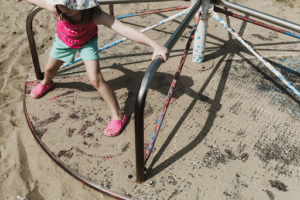
Has your cheerful child ever quickly become a ball of tears when a near-by peer begins crying? Have you ever lost the pep in your step after spending time around a grumpy co-worker? This is because the feelings and behaviors of people in close proximity to us, directly impact how we feel, and respond to our own emotions. In the same way adults are impacted by others actions, children pick up the moods of others around them. However, being able to regulate emotions effectively and efficiently is not an innate skill. A child’s capacity to manage their big emotions relies on their brain development and their experiences. Therefore, when feeling upset or overwhelmed children look to their caregivers for help with regulating their emotions and appropriately respond to external stressors. Read More ›

